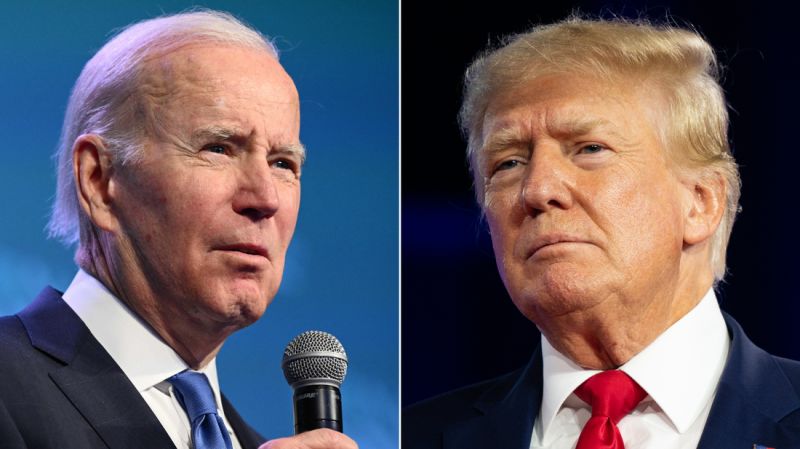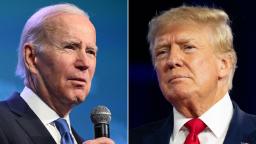

CNN
—
For people who write about electoral, or “horse race,” politics, few things are more enjoyable than an exciting presidential primary season.
Sometimes, both Democrats and Republicans cooperate by holding gripping fights for the party nods (see 2008). Sometimes, however, voters in both parties quickly coalesce around front-runners (see 2000).
A look at the current dynamics in both parties suggests 2024 could be one of the most, if not the most, boring primary cycles in the last 50 years.
Nothing is set in stone. Things can change when you least expect it, but it’s tough not to acknowledge the current facts.
Let’s start on the Democratic side, where President Joe Biden is expected to announce as early as Tuesday that he is running for reelection. No incumbent president has lost a state primary (where he was on the ballot) since 1980.
At this point, Biden doesn’t look likely to break that streak. He hasn’t attracted a challenger who would be considered serious under most metrics. Neither Marianne Williamson nor Robert F. Kennedy Jr. has ever held elected office. Williamson gained no traction during her 2020 presidential bid. Kennedy pushes debunked conspiracy theories about vaccine safety and is seeking votes from an electorate that is overwhelmingly vaccinated against Covid-19.
The very limited polling so far shows Biden with a large advantage over Williamson and Kennedy.
Perhaps more importantly, few Democratic elected officials have indicated anything other than loyalty to a 2024 Biden bid. That’s key for a few reasons.
First, primary endorsements are as good a predictor at this point of primary success as polling is.
Second, it’s true that Democratic primary voters tell pollsters they are open to listening to a credible challenger to Biden. The president, after all, would be 82 years old at the start of a potential second term.
But as Billy Preston once sang, “Nothin’ from nothin’ leaves nothin’.” That polling hypothetical means nothing if no one with a base within the party runs.
Biden’s strong approval rating among Democrats is well in line with that of previous incumbents who cruised to renomination. So it’s not like Democratic voters will be kicking and screaming if they have to support Biden for another term.
On the Republican side, former President Donald Trump finds himself in his best position in a very long time to win the GOP nomination.
I’m unaware of a single recent reliable national or early-voting-state-level poll that shows Trump with anything other than a “big league” edge over both declared and potential 2024 opponents. He’s regularly at around 50% in national surveys.
This 50% is key because it’s so rare for someone to be polling at that level at this early juncture and not win the nomination. Bob Dole in 1996, George W. Bush in 2000, Al Gore in 2000 and Hillary Clinton in 2016 were the sole candidates running in incumbent-free primaries who were near, at or above 50% in early national polling.
All four of them were able to secure the nominations with relative ease, and Clinton was the only one who lost more than a handful of primary contests.
For an example of someone polling like Trump is now and then losing the party nomination, you have to look at primaries involving an incumbent. Ted Kennedy lost the 1980 Democratic primary to President Jimmy Carter, despite easily leading him in polling at this point in the cycle.
It’s possible that since Trump is the first former president to actively seek a presidential nomination in over 80 years, the early national polling means less than it normally does.
That said, Trump has more going for him than national polling. For one thing, his early-state-level polling looks as good as it has in a while. A University of New Hampshire poll released last week puts him up 20 points on Ron DeSantis in a hypothetical Granite State GOP primary, after he trailed the Florida governor by 12 points in January.
This polling is supported by something that eluded Trump when he first ran for the presidency in 2015: endorsements from elected officials. Trump didn’t get his first one from a governor or member of Congress until after winning his first primary contest during the 2016 cycle.
This time around, Trump already has over 60 endorsements from governors and members of Congress. Since 1980, candidates with comparable collections of gubernatorial and congressional endorsements at this point in the cycle have all gone on to win their parties’ nominations.
Most impressive is what Trump has done in Florida. DeSantis would be Trump’s most serious challenger by far if he decides to run. He’s the only one breaking into double digits in the average national and early-state polling.
Yet Trump has gone into Florida and already secured endorsements from a majority of Republicans in the state’s US House delegation. Some of those endorsements aren’t surprising (e.g., Rep. Matt Gaetz). Some of them are notable, such as Rep. Byron Donalds, who introduced DeSantis at his 2022 reelection victory party.
Trump, like Biden, seems to have two things going for him: a large share of Republican voters and the party behind him. If those two were in opposition to each other, the primary season would have looked far more interesting.
So unless something changes, we’re looking at a recipe for primary success for both the current president and the man he succeeded.
